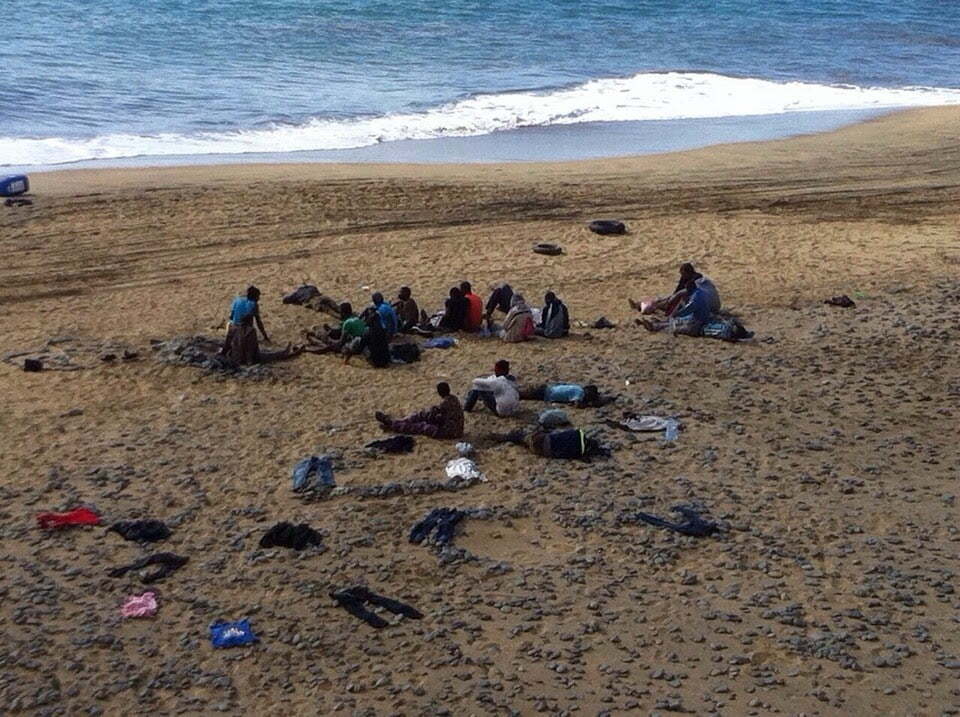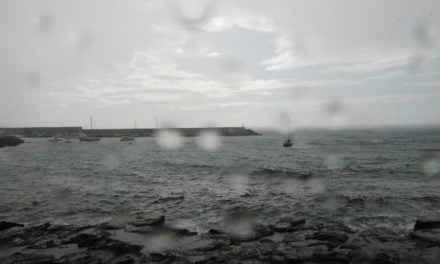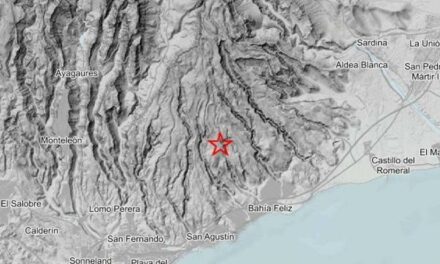The Spanish Central Government’s Council of Ministers this Tuesday approved an initiative from the Ministry of Inclusion, Social Security and Migrations, agreeing to contract the public company Tragsa, for the amount of €51 million, to provide properly managed migrant reception services on The Canary Islands over the next year.
 Government spokesperson, María Jesús Montero, announced at the press conference following the Council of Ministers, that the Ministry’s commission will consist of “the provision of a series of basic services in these migrant reception facilities to provide dignified humanitarian care, in safe conditions, to the migrants, and the vulnerable, who arrive on the Canary Islands”.
Government spokesperson, María Jesús Montero, announced at the press conference following the Council of Ministers, that the Ministry’s commission will consist of “the provision of a series of basic services in these migrant reception facilities to provide dignified humanitarian care, in safe conditions, to the migrants, and the vulnerable, who arrive on the Canary Islands”.
Among the services that will be provided are included food, security, cleaning and maintenance of reception centres, able to accommodate up to 7,000 migrants at a time, explained Montero.
Following the apparent lack of preparedness to face last years predicted “sudden” increases in arrivals via The Canary Route, the Spanish Government are attempting to ensure that they do not get caught out once more. The term of the agreement between the Ministry and Tragsa will extend throughout this year, from July 13, 2021, until July 12, 2022. There has already been a significant increase in arrivals this year, which is expected to continue through the autumn, hopefully with a little more planning as to how we will cope with a new influx.
Until April 24, the Secretary of State for Migration – with the authorisation of the Ministry of the Interior – had transferred 4,385 people from the Canary Islands migrant reception camps and other reception centres on the islands, taking them to resources on the mainland, according to information obtained via the Portal de Transparencia, a Spanish Open Government resource funded to facilitate citizens’ access to information and good governance. Sources close to the situation estimate that by the end of May that number may have reached 6,000 people. The 2021 transfer figures contrast starkly with the rigidity with which transfers were being authorised last year when, despite the humanitarian crisis that caused the arrival of more than 23,000 migrants, barely 2,168 people were authorised for referral. Thousands of vulnerable people, many of whom were not candidates for expulsion, were detained on the islands for months, unable to leave even if they had valid tickets and travel documents.
Migrant Reception Referrals from the Canary Islands
The Ministries of Interior and of Migrations have not yet offered any official explanations why the numbers of transfers have been increasing, in fact they do not recognise the increase, but a mixture of factors, including court rulings against the continued blocking of travel, as well as a damning report from Spain’s Ombudsman, among others, have clearly smoothed the path and led to increased resources having been made more available. The gradual relaxation of covid-19 concerns and restrictions as well as the basic need to manage the day-to-day situation on the islands have all meant the transfer of thousands of migrants from the islands, which in turn helps to decongest the reception camps, which still accommodate hundreds of people who have met the vulnerability requirements to be referred. The transfers have helped to reduce social tension and conflicts at the centres themselves and will help to facilitate management of an expected increase in arrivals over the coming months. Arrivals have already more than doubled since the beginning of the year, with summer and autumn expected to bring more, though expulsions are expected to also be much higher this year so long as the pandemic remains under control.
 There are currently just over 4,000 irregular migrants still on the Canary Islands, though that number is expected to continue to drop over the coming days and weeks. This now represents the lowest figure since the Canary migrant crisis became most apparent during the second half of last year, and all in the midst of border closures and restrictions due to coronavirus having paralysed travel across the globe. Of the 23,023 arrivals in 2020, more than 16,000 arrived in just the last three months of the year, half of those in November alone. Last December there were still more than 8,000 individuals in migrant reception facilities and among them were potentially thousands of vulnerable migrants (including some families, mothers with their children, asylum seekers, the sick and others) who all met the requirements to be transferred to centres on the Peninsula, but they were not allowed to leave. Thirteen, otherwise empty, hotels were employed to assist, after the Arguineguín dock, where the red cross had set up a makeshift camp for up to 400, had become overcrowded with more than 2,600 people in November, while deportations remained suspended due to the pandemic. There were several other resources available on the Peninsula, but the Interior Ministry voiced concerns that facilitating transit could generate a “call effect”.
There are currently just over 4,000 irregular migrants still on the Canary Islands, though that number is expected to continue to drop over the coming days and weeks. This now represents the lowest figure since the Canary migrant crisis became most apparent during the second half of last year, and all in the midst of border closures and restrictions due to coronavirus having paralysed travel across the globe. Of the 23,023 arrivals in 2020, more than 16,000 arrived in just the last three months of the year, half of those in November alone. Last December there were still more than 8,000 individuals in migrant reception facilities and among them were potentially thousands of vulnerable migrants (including some families, mothers with their children, asylum seekers, the sick and others) who all met the requirements to be transferred to centres on the Peninsula, but they were not allowed to leave. Thirteen, otherwise empty, hotels were employed to assist, after the Arguineguín dock, where the red cross had set up a makeshift camp for up to 400, had become overcrowded with more than 2,600 people in November, while deportations remained suspended due to the pandemic. There were several other resources available on the Peninsula, but the Interior Ministry voiced concerns that facilitating transit could generate a “call effect”.
 The build up of so many people in temporary migrant reception facilities during those months ended up generating tensions among the resident population, exacerbated in many cases by misinformation, which led to various demonstrations demanding solutions to problems that could not be solved quickly, nor easily. Some even tried to equate the lack of tourists with the temporary accommodating of migrants in empty tourist resort towns. The Spanish far-right repeatedly tried to impose their own agenda, joining several of the marches and attempting to form mobilisations of their own. This discomfort is still evident in some of the municipalities, particularly near where camps have been set up, and the situation is still very complicated in various centres that house large numbers of people, and in particular unaccompanied minors who represented more than 10% of the arrivals last year, with more than 20 emergency accommodation facilities suddenly having to be set up without prior warning. Some 300 or so have had to remain in temporary hotel accommodations for nearly 8 months, cared for by specialist NGOs, due to a total lack of alternatives. This has led to angry complaints from nearby residents, primarily due to noise and occasional incidents disturbing people’s sleep.
The build up of so many people in temporary migrant reception facilities during those months ended up generating tensions among the resident population, exacerbated in many cases by misinformation, which led to various demonstrations demanding solutions to problems that could not be solved quickly, nor easily. Some even tried to equate the lack of tourists with the temporary accommodating of migrants in empty tourist resort towns. The Spanish far-right repeatedly tried to impose their own agenda, joining several of the marches and attempting to form mobilisations of their own. This discomfort is still evident in some of the municipalities, particularly near where camps have been set up, and the situation is still very complicated in various centres that house large numbers of people, and in particular unaccompanied minors who represented more than 10% of the arrivals last year, with more than 20 emergency accommodation facilities suddenly having to be set up without prior warning. Some 300 or so have had to remain in temporary hotel accommodations for nearly 8 months, cared for by specialist NGOs, due to a total lack of alternatives. This has led to angry complaints from nearby residents, primarily due to noise and occasional incidents disturbing people’s sleep.
Transfers continue to be carried out based on vulnerability criteria (families, mothers with their children, asylum seekers, the sick …) but as well as that several thousand migrants have also been able make their own way, if they have the documentation that allows them to take a plane or a boat. In the case of referrals, the NGOs that manage the reception centres on the islands draw up lists of those who meet the vulnerability requirements and send them to the Ministry for Migration, which, in turn, requests authorisation from the Ministry of Interior for the Police to issue a pass for each of them. These referral transfers are financed by the Ministry for Migration, which relocates the migrants to reception centres on the Peninsula that are more suitable for their specific needs. From these centres, many of the migrants are able to meet up with their families and friends in other provinces or elsewhere on the continent.
The Government’s lack of transparency about referrals has been pretty constant since the migration crisis became overloaded at the end of last year. Spain’s Government delegate in the Canary Islands, Anselmo Pestana, said in August to the Spanish News agency Efe: “Derivaciones? That is not talked about, because it can generate a call effect, obviously”. Pestana stated that if transit to the Peninsula was openly facilitated for migrants rescued in the Canary Islands “instead of 3,000 arriving, 30,000 will arrive”. On the premise that reporting the number of people leaving the islands for humanitarian reasons might encourage more arrivals, the authorities have refused to release this information. However respected Spanish language daily, El Pais, was able to obtain these data after requests through the Transparency portal to the Secretary of State for Migration and the Interior. After two months of waiting, Migrations responded, while the Ministry of Interior refused to give out the information.
The main objective of the Migrations Ministry now, is to improve conditions in the camps, with the macrocentre of Las Raices, on Tenerife, seen as a priority. Although it has never reached its maximum capacity of 2,400 people, the camp has hosted more than 1,500 migrants and various problems since its inauguration last February have been fairly constant. Installed in one of the coldest and wettest areas of the island, there was no hot water, the food was often insufficient and conflicts between groups of different nationalities ensued. The current plan is that by the end of May, the capacity of Las Raices, which now accommodates more than 1,100 migrants, will not exceed 800 people.
Of course all of this preparation, as welcome as it is, only goes a small way towards dealing with the issues. We are simply managing resources to try to cope with the symptoms of a problem that originates elsewhere.
Reception, referral, asylum or expulsion are all necessary parts of our response, but this problem isn’t going to just disappear. We need large scale, long term commitments made to help change the circumstances that cause people to risk their lives in this way.
The truth is we are only seeing a very small part of the problem. More than 4.2 million displaced people in the Sahel are trying to survive water poverty, oppression, failed crops, resource depletion, armed conflict, rape, torture, violence and corruption. We need to focus our efforts on trying to improve the prospects of the people in these countries, and to provide more adequate pathways for temporary migration and transfer of knowledge and support to help ensure that Africa’s future does not depend on so many people trying to escape to Europe.
Africa’s future is in Africa, and in partnership with Europe and the rest of the world.
IMHO Timon .:.
















You need to ensure this doesn’t further impact tourism – uk tourist are already talking of not visiting due to safety as there are numerous numbers of migrants that walk around=d the tourist area
Covid has been the primary and main impact on tourism. Migration issues have not impacted it at all, save for a few angry people making the situation sound a lot worse than it really is. There is no way to ensure there is not more migration unless we invest in the countries of origin.
Nearly 5m are displaced in the Sahel right now, and if we ignore that then we are accepting that a few thousand of those people will occasionally try to reach us here, or we can try to do something about it, and accept that a few thousand will occasionally risk their lives to try to reach us here. But it is near impossible to police more than 1000km of coastline and a maritime zone that stretches to 1M square km ocean.
It is worth remembering also that in 2006 nearly 32,000 migrants reached these shores and we continued to cater for more than 10M tourists without serious incident, nor measurable impact on future years. It was a clear demonstration of what is possible, with a little care and forethought. Any tourists who believe that migrant arrivals are stopping tourism are ignoring the fact that tourism has been stopped for 14 months and with luck will now start to reopen. Our biggest concerns are our tourism economy, our environment and the ongoing global pandemic.
We encourage anyone with concerns to come see for themselves, this is a safe and welcoming destination full of the most wonderful people from all across the world.